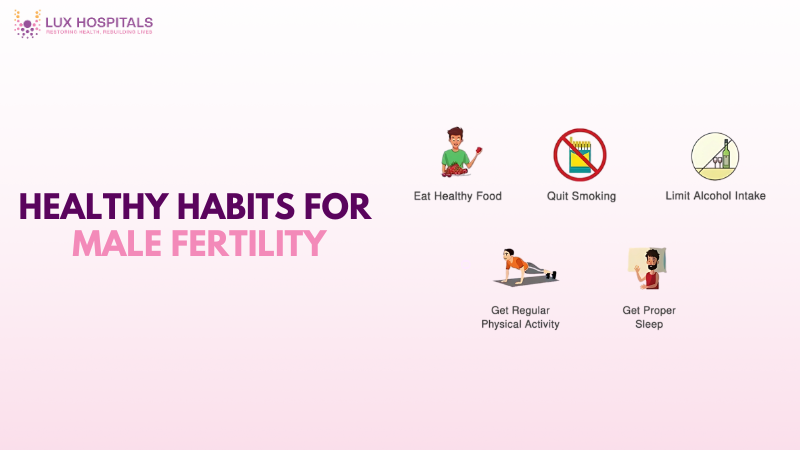The Best Foods and Habits to Support Men’s Reproductive Health

Men’s reproductive health is also determined largely by their lifestyle and daily diet. Fertility, hormone balance, and sexual function can be optimized by a nutrient-rich diet, proper hydration, and avoiding too much consumption of unhealthy foods such as junk food and alcohol. Key nutrients such as zinc, omega-3 fatty acids, and antioxidants play a vital role in sperm quality and testosterone production. This guide highlights the best foods and essential habits every man should adopt to support and enhance his reproductive and overall health naturally.
Nutrition Tips to Boost Men’s Fertility
Intelligent foods like antioxidants, zinc, and omega-3s have been found to increase levels of testosterone, enhance sperm quality, and better men’s reproductive health for long-term hormonal and fertility gains.
Eat More Antioxidant-Rich Foods:
Antioxidants fight oxidative stress, which is a leading cause of reduced sperm motility and count. Food supplements that guard against sperm DNA and improve sperm health include dark chocolate, pecans, spinach, and blueberries. Daily intake of these foods can sustain men’s reproductive health through the activation of cell renewal as well as inflammation reduction.
Prioritize Zinc-Rich Foods:
Zinc is necessary for testosterone production and the development of sperm. For men, foods high in zinc include pumpkin seeds, oysters, chickpeas, and beef. A healthy zinc balance increases sperm volume and sex desire, which benefits men’s sexual health.
Limit Processed Sugar and Refined Carbs:
Excess sugar and refined carbs can lead to insulin resistance, which disrupts testosterone levels and reduces sperm quality. Replacing sugary snacks with fruits and whole grains can stabilize hormones and improve fertility. Reduce processed food intake and focus on natural, whole foods to improve men’s reproductive and fertility health.
Increase Omega-3 Fatty Acids:
Omega-3s found in salmon, chia seeds, and walnuts enhance sperm membrane integrity and blood flow to the vaginal area. Also, these healthy fats decrease inflammation, one of the main causes of hormone imbalance. A diet high in omega-3 improves the reproductive health of men by improving sperm motility and morphology.
Stay Hydrated with Water:
Dehydration can thicken semen and restrict sperm motility. Consuming water in the right amount on a daily basis ensures seminal fluid and sperm delivery at optimal efficiency. This is one simple but important step towards making use of the potential of men and overall reproductive health.
Add More Leafy Greens Folate:
Folate, a nutrient necessary for the proper growth of sperm, is abundant in leafy greens such as kale, spinach, and arugula. Reduced fertility and sperm abnormalities are associated with folate insufficiency. Incorporating leafy greens into men’s everyday meals significantly enhances their reproductive health.
Plant-Based Proteins:
Over-Red Meat Excessive consumption of red meat’s saturated fats can harm sperm and testosterone levels. Quinoa, beans, tofu, and lentils provide protein without the bad fats. Shifting to plant-based proteins can benefit men’s cardiovascular and reproductive health.
Avoid Excessive Alcohol :
Alcohol lowers testosterone, affects sperm quality, and impairs sexual performance. Reproductive functions are protected by reducing alcohol use or switching to moderate, infrequent drinking. Long-term maintenance of men’s reproductive health and overall men’s health requires a reduction in alcohol intake.
Avoid Caffeine:
Excessive caffeine (more than 300 mg/day) can negatively impact sperm DNA and motility. Replacing extra cups of coffee with herbal teas or water helps reduce caffeine overload. Moderate coffee consumption supports men’s reproductive health and general energy balance.
Opt for Organic
Pesticide residues in non-organic produce and dairy may act as endocrine disruptors, interfering with hormone balance. Choosing organic food options reduces exposure to harmful chemicals. Select organic versions of high-demand foods like apples, spinach, and strawberries for better men’s reproductive and fertility health.
Incorporate Healthy Fats
Healthy fats from olive oil, avocado, and nuts are necessary for hormone synthesis and reproduction. These fats support testosterone levels and promote good cholesterol, which aids in hormone synthesis. Regular consumption of healthy fats improves men’s general and reproductive health.
Take a Multivitamin if Necessary
Sometimes, diet alone can’t meet all nutrient needs, especially if dietary restriction absorption issues exist. A high-quality multivitamin ensures the body gets key nutrients like vitamin D, zinc, selenium, and folate. Supplementing wisely supports men’s reproductive health by filling dietary gaps and strengthening fertility health.
Conclusion
Men’s reproductive health can be significantly impacted by little dietary adjustments. Men can significantly improve their sexual and fertility health by avoiding toxic pharmaceuticals, eating a balanced diet full of essential minerals, and concentrating on nutrient-dense meals, drinking lots of water, and avoiding harmful substances like alcohol and sweets. These adjustments are easy to make and have long-term advantages for men’s reproductive and fertility health. A healthier diet means a healthier you and a stronger foundation for future family planning.
Frequently Asked Questions
Foods rich in antioxidants, zinc, omega-3 fatty acids, and folate, like berries, oysters, salmon, and leafy greens, boost men's reproductive health. These nutrients support sperm quality, testosterone levels, and libido. Consuming these items regularly improves reproductive health outcomes.
Sperm motility and count can be reduced by a bad diet high in processed foods and sweets. Diets high in fruits, vegetables, and lean proteins improve the shape and production of sperm. Maintaining men's fertility and reproductive health requires improving their diet.
Yes, maintaining proper hydration aids in sperm motility and semen volume. Water is required to produce healthy seminal fluid, which facilitates sperm motility. Enough hydration enhances men's reproductive health and general function.
Moderate coffee intake (1–2 cups/day) is usually safe, but excess caffeine may damage sperm DNA. Reducing caffeine can help improve fertility and hormonal balance. Keeping caffeine consumption in check supports men's reproductive health.
Specific vitamins like C, E, D, and folate improve sperm health, motility, and hormone levels. Supplements or a well-balanced diet can help fill nutritional deficits. Adding essential vitamins to your regimen improves men's reproductive and fertility health.





















